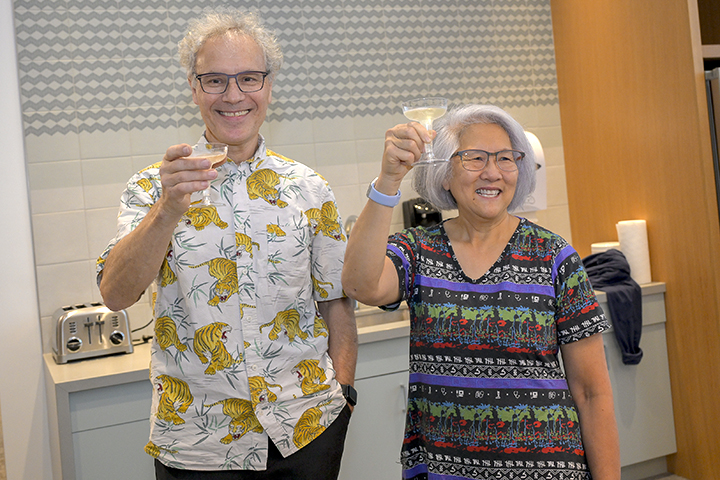Celebrating discovery at Hudson Hoagland Society annual meeting
Nobel laureate Victor Ambros: ‘Curiosity is the fuel of discovery’
Date Posted: Monday, June 16, 2025
Inspirational words from UMass Chan Medical School’s most recent Nobel laureate Victor R. Ambros, PhD, brought added poignancy to the 40th annual meeting of the Hudson Hoagland Society (HHS) on May 21 amid a challenging moment for science.
Dr. Ambros, the Silverman Chair in Natural Sciences and professor of molecular medicine at UMass Chan, delivered a talk titled “Exploring the RNA Frontier and Why It Matters to You,” alongside his wife and scientific collaborator, Rosalind “Candy” Lee. He shares the 2024 Nobel Prize in Physiology or Medicine for his co-discovery of microRNA, the very short, single-stranded RNA molecules that are now understood to play a critical role in post-transcriptional gene regulation.
In his talk, Dr. Ambros highlighted the societal benefits of basic science research. He noted that while the relief of human suffering is the ultimate return on investment, achieved through new knowledge and the development of novel diagnostics and therapeutics, he emphasized that this outcome requires time to achieve.
“It takes a lot of people a lot of work to make real the viable, practical applications of a therapy,” said Dr. Ambros.
The Hudson Hoagland Society, named for the co-founder of the Worcester Foundation for Biomedical Research, is predicated on the understanding that biomedical research leads scientists and society in unexpected directions, driven by the curiosity of investigators—a belief echoed by Dr. Ambros, who noted “curiosity is the fuel of discovery” when describing the “accidental” discovery of microRNAs.
When Dr. Ambros and his own lab discovered microRNA, also known as miRNA, in the nematode C. elegans in 1993, its broad implications for human biology weren’t immediately apparent. Decades later, scientists now know the ability of these tiny RNA molecules to regulate or silence gene expression has a profound and far-reaching impact on most biological processes governing health and disease, including development, aging, cancer, diabetes, heart disease, Alzheimer’s disease, schizophrenia and many others.
More immediate benefits of basic research include economic stimulus, and importantly to Dr. Ambros, the opportunity to train the next generation of highly skilled scientists.
“Because of this uncertainty and the length of time it can take for the payoff of basic research to manifest itself throughout my career, I have always focused on what I knew to be the immediate impact of what I did,” said Dr. Ambros. “And that is training people in the lab.”
These individuals are people who are passionate about science. They're generating new ideas, they're learning how to become independent investigators, they’re becoming productive and talented and creative members of the scientific workforce.”
The Hudson Hoagland Society, named for the co-founder of the Worcester Foundation for Biomedical Research, is predicated on the understanding that biomedical research leads scientists and society in unexpected directions, driven by the curiosity of investigators—a belief echoed by Dr. Ambros, who noted “curiosity is the fuel of discovery” when describing the “accidental” discovery of microRNAs.
Funds raised through the Hudson Hoagland Society are used to support the most promising and innovative research at UMass Chan. These "seed" grants are awarded based on a competitive review process and allow a researcher to pursue new, innovative research for which he or she may not yet have funding.
Chancellor Michael F. Collins expressed gratitude to HHS members as “stalwart supporters of biomedical research” amid disruptive changes in federal support for scientific research.
“Now, more than ever, it's important for us to seek out partnerships with and support from those individuals, organizations and foundations that understand research’s value proposition, all of whom can help us continue along our growth trajectory,” said Chancellor Collins.
